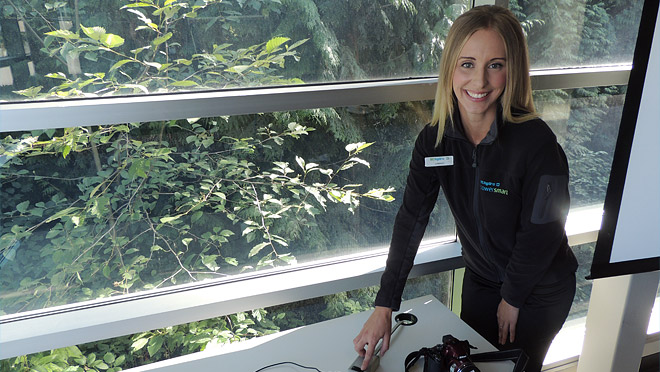Tips and behaviour to keep standby power from getting scary

Do you know the number of electronics in your home?
Posted by Lyndsey Stark
If you look closely, you might see it.
Chances are, your home has its fair share of electronics and devices, sucking energy when you're not even looking. Our electronic devices might be getting smaller, but they're also growing in number.
Many people try to do their part by turning items off before they leave home, or purchasing efficient models. But even if you've picked up some efficient behaviours, you might not be doing all you can to keep your electronics energy-hungry habits in check.
Here are some of my favourite tips to manage the electricity use from your electronic devices.
Today's devices are efficient, but all that standby power adds up
For most common consumer electronics available today, such as computers and stereos, advances in technology have brought along big gains in energy efficiency. The overall size and energy usage of many electronic devices is shrinking, but what's not shrinking is how many that we own.
Today, the average B.C. household has 25 or more electronic devices, and every year countless new gadgets are offered up. Consider tablets — even just a few years ago, almost no one had one, and now they're everywhere, and they all require electricity to charge.
Doing my best to be Power Smart, I limit the electronics in my life. I took a look around my home and counted up my devices: one laptop, one router, one cell phone and a TV that has yet to be plugged in. Making sure to unplug my charger when not in use, I am doing my best to make sure electronics don't take up too much of my energy bill.
How many do you have? Considering how many you have can be a great first step to determining what you can unplug. You might even decide you don't need some that you're no longer using.
Big televisions mean bigger consumption
If you purchased your television in the last five years, it's definitely more efficient than that old TV from the previous few decades. But how many televisions are in your house, and how many do you actually use regularly?
Since the 1970s, the average number of televisions per household has doubled and is still on the rise. Screen size has also grown by 50 per cent, taking the average size from 30 to 46 inches.
The newest television models keep getting bigger and better, except when it comes to electricity use; then they're just bigger. Leave scary surprises to the movies — not your energy bill — by following these Power Smart tips:
- Consider buying ENERGY STAR® TVs, which use at least 30 percent less energy than a standard model. If you're shopping for a new television, check out a full list of ENERGY STAR models.
- Bigger isn't always better. Find the right size TV for your room by measuring the distance between the screen front and the couch and dividing by 2.5. Check out the website for an example.
- Many new TVs are set to "retail" mode to make them brighter and more visible in a retail environment. Maximize TV usage by switching it to "home" mode to cut consumption while prolonging the lifespan. Check your owner's manual to find out how to make the switch.
Computers are taking over, but don't let them take over your electricity bill
We see it all the time in Hollywood — computers taking over. It might be the stuff of science fiction, but don't let the computers in your home take over your energy bill. Many computers, especially desktop models, are left on all hours of the day, drawing electricity even when they're not in use.
Quick reminders on easy ways to cut back on your computer's electricity use:
- Screen savers aren't saving you any electricity. Turn off your monitor completely for instant savings when you're away from the computer.
- Turning down the brightness on your screen is easy on the eyes and the wallet.
- Plug your computer and accessories such as printers into a power bar. That way you can easily switch off the entire power bar to cut standby power.
Laptops are lighter on energy use
If you're purchasing a new computer, consider switching the old desktop model for a more efficient laptop. This smaller, battery-powered device is 90 per cent more efficient than a standard desktop computer.
You'll need to use electricity to charge the battery, so remember to unplug the charger from the wall when not in use. Turning off your laptop between uses will conserve the battery and prolong its life.
Want to save even more energy? Tablets are just about as small (and efficient) as you can get. If it matches your computing needs, you can choose a tablet for you and save. Just remember not to leave the charger in the wall.
Ready to cut back? Recycle those electronics
If you're purchasing new electronics this fall, or if you've decided to cut back on the number of devices, you can win the battle by disposing of unneeded electronics. Return-It will recycle TVs and electronics free of charge when you drop them off at a depot near you.
Find a depot near you to recycle electronics for free
Lyndsey Stark is a Community Outreach representative with BC Hydro who educates customers in the Lower Mainland about ways to save energy and money.